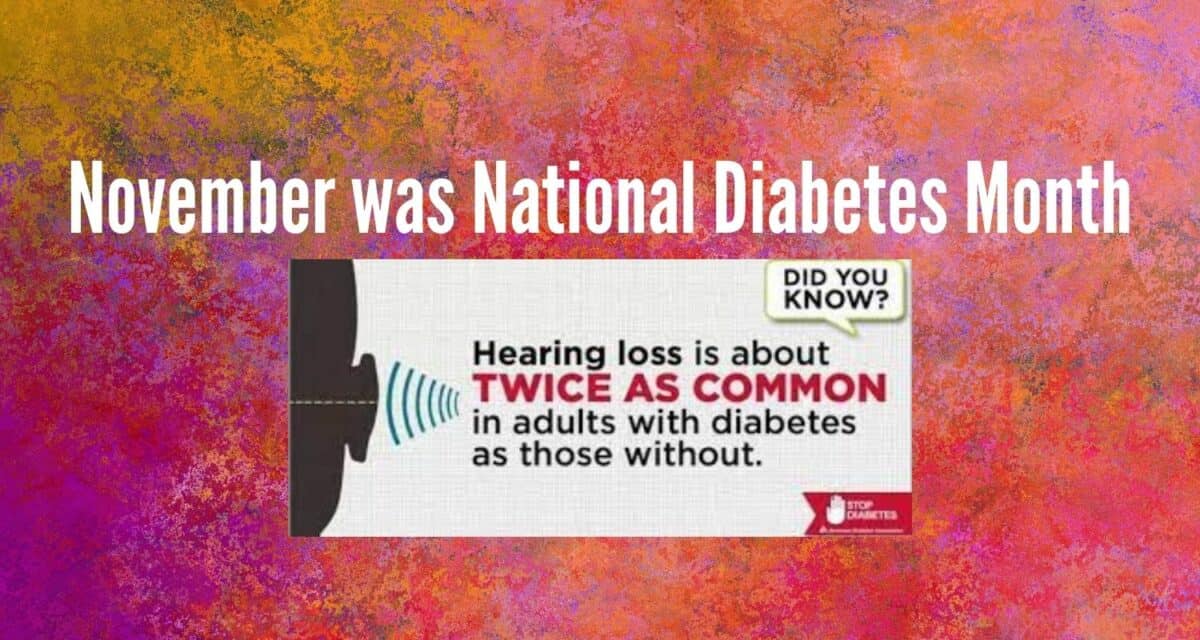November was National Diabetes Month. It is well documented by the Centers for Disease Control and Prevention (CDC) that diabetes, with projections to impact one in three adults by 2050, brings with it a multitude of related risks and side effects. The most serious—and life-threatening—of which are heart attack, stroke, cancer and kidney damage. Others include fatigue, digestive (bloating, heartburn, nausea) and damage to blood vessels and nerves. Vision difficulties, such as cataracts and glaucoma, are also well documented (CDC) and generally monitored.
While there is also overwhelming evidence linking diabetes to hearing loss, it seems to fly a bit under the radar. It is more common than you might think. It is estimated that the rate of hearing loss for the 34.2 million Americans with diabetes is twice as likely and 30% more likely for those with prediabetes.
Hearing loss in a person with diabetes often presents earlier than in those without diabetes, and the risk increases when that person has co-conditions (neuropathies, high blood pressure, and cardiovascular disease).
Diabetes does not commonly cause severe to profound hearing loss, but rather increases risk for acquired hearing loss and enhanced risk for balance dysfunction with onset of these problems earlier than observed in persons without diabetes. Hearing and balance screening allows us to establish a baseline to be able to observe changes earlier and provide appropriate recommendations for prevention and early intervention.
The damage that elevated blood glucose has on the other small vessels in the body is similar in the ear. When glucose levels are high, the small vessels in the inner ear start to break and the broken blood vessels disrupt normal hearing.
While Diabetes-I generally develops in childhood and commonly requires insulin, Diabetes-II can develop in adulthood and, along with genetics, be the product of poor diet and exercise. The disease can be managed with levels coming into the normal range with medication (and diet and exercise), one naturally wonders if any hearing damage can be restored.
If the damage is minimal, it can be reversed. If there has been extensive vessel or nerve damage, it may not be reversed, but it is possible that treatment options, including hearing devices, can allow for one to be able to hear all decibels again. We encourage individuals to see a DCES (Diabetes Care and Educational Specialist), get screened, and work closely with us at Hearing Solutions of North Carolina to improve your hearing and cognition.
There is a pathophysiology of diabetes on hearing and balance. Diabetes causes disruption in small blood vessels throughout the body as well as neural degeneration.
For hearing, this disruption can cause not only peripheral hearing loss, but due to microangiopathy in the brain, also central auditory processing disorders. For balance, there appears to be more BPPV (Benign paroxysmal positional vertigo) associated with diabetes, which can be easily treated if identified. The eighth nerve transmits information from both the cochlea and vestibular system to the brain, so nerve degeneration will affect both systems.
As important as convincing agencies (such as the CDC) to acknowledge the connection, challenges and issues related to hearing and diabetes, developing strategies to build awareness of this connection is also critical.
Hearing loss is an invisible handicap. Because of anosognosia (the inability of a person to recognize a sensory disorder), many people with a hearing loss cannot determine they have a hearing problem. Physicians may see anxiety, depression and confusion before suspecting hearing loss.
CDC has recommended that we, as hearing healthcare providers, educate primary physicians about hearing loss, risk of falls, central auditory processing disorders, and diabetes and give them tools to screen for any hidden problems.
You can help us make this possible by talking to your physician about the correlation between your diabetes and possible hearing loss. Most physicians have hearing screeners in their office. Request a referral from you physician for a Functional Hearing Assessment to our office for a full diagnostic hearing evaluation.
Over 34 million people in the U.S. have diabetes. This life-long condition can increase health risks including contribution to the development of hearing loss. Remember, people with diabetes can be twice as likely to also experience hearing loss compared to people without it. So, call Jamie or Diane at 7084-633-0023 to schedule your appointment today.
To learn more about the services we provide visit our website www.hearingsolutionsofnc.com and remember to “like” us on Facebook. Jane, Cheryl and I look forward to seeing you soon.

